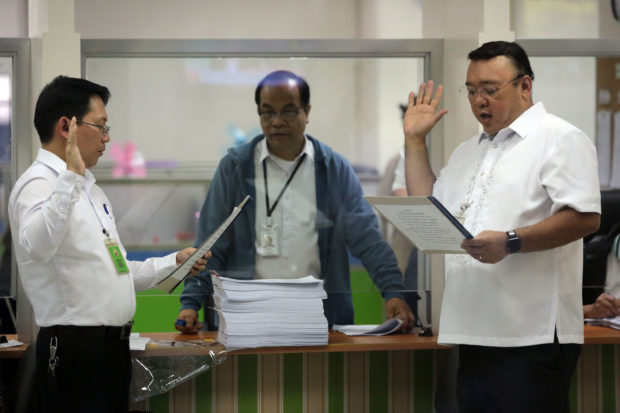
OFW CONTRIBUTION SCAM Whistleblower Ken Sarmiento and former presidential spokesperson Harry Roque file graft and other charges against PhilHealth executives Dennis Mas, Narisa Sugay and Gilda Salvacion Diaz and resigned Senior Vice President Ruben John Basa for not acting on reports about transactions that defrauded overseas Filipino workers of their contributions. —GRIG C. MONTEGRANDE
MANILA, Philippines — Despite President Rodrigo Duterte’s order to clean up Philippine Health Insurance Corp. (PhilHealth), some of its officials are still engaged in scams that have defrauded the government of some P16 million in contributions from overseas Filipino workers (OFWs), according to former presidential spokesperson Harry Roque.
So on Wednesday, Roque and PhilHealth whistleblower Ken Sarmiento filed cases against four officials of the health insurance firm for graft, dereliction of duty, grave misconduct, gross neglect of duty, grave abuse of discretion and conduct prejudicial to the best interest of the service.
Charged were Senior Vice President Dennis Mas, Acting Vice President for Member Management Group Narisa Sugay, Vice President for National Capital Region Gilda Salvacion Diaz and former executive vice president Ruben John Basa.
Roque and Sarmiento also called on the Office of the Ombudsman to suspend the respondents while the investigation of the complaint was going on.
In a complaint, Sarmiento, former head of the Philippine Overseas Employment Agency-Overseas Filipino Professionals (POEA-OFP) Operations Office, detailed the scheme in which some liaison officers of recruitment agencies and some PhilHealth employees defrauded OFWs by faking receipts, making the workers believe that they had paid their P2,400 yearly contribution.
The payments, according to Sarmiento, were pocketed by some liaison officers and PhilHealth employees.
Conclude NBI probe
The complaint came as PhilHealth President Ricardo Morales urged the National Bureau of Investigation to conclude its investigation of the fake receipts issued to migrant workers so that the health insurance agency could sanction any official who may have benefited from or failed to take action on the irregularity.
Morales said the state insurance firm investigated the scam in 2015 and found that it was the “liaison officers of the employment agencies” who were behind the fabrication of PhilHealth official receipts (PORs) issued to OFWs.
PhilHealth’s findings were turned over to the NBI then as Morales said that the agency had an agreement with the law enforcement agency that the bureau would work on and pursue the filing of criminal cases.
“When we contacted them recently, they told us that it’s ongoing,” Morales told reporters on Wednesday.
Given that it was not only the OFWs but also PhilHealth that fell victim to the scam, Morales said it was high time the NBI resolved the matter, especially in light of the graft charges filed in the Ombudsman against four high-ranking PhilHealth officials.
When asked if the officials allegedly involved in the latest complaint still enjoyed his trust and confidence, Morales said that he would go with the evidence.
Falsified receipts
During his time in PhilHealth, Sarmiento was able to gather over a thousand PhilHealth premium receipts issued by liaison officers of recruitment agencies from 2014 to 2018. After examining an initial 244 receipts, he found that all were fake.
“We can’t just let this kind of widespread corruption go unnoticed, especially when it is happening right under our noses,” he said during the filing of the complaint.
“Respondents’ acts cause undue injury to the government, PhilHealth and OFW-PhilHealth members when they lost an estimated P16.58 million in net unremitted premiums, which should have been received, were it not intercepted by unscrupulous liaison officers,” the complaint added.
Inaction on irregularities
Sarmiento and Roque filed the case because the PhilHealth officials had refused to act on Sarmiento’s numerous reports of irregularities in the POEA-OFP office.
“From the foregoing, it is clear that the respondents acted with gross inexcusable negligence when they failed to act and respond to the anomalous transactions presented by respondent Sarmiento,” read the complaint.
Sarmiento explained to the Inquirer that he computed the number of deployed OFWs who had no posted PhilHealth premiums and found that the state insurance agency had failed to collect some P16.58 million, representing roughly 6,910 migrant workers. OFWs cannot leave the country without an overseas employment certificate, which in turn cannot be issued without them paying PhilHealth premiums, among other things, Roque said.
Roque said this likely meant that the OFWs paid, but the government was not able to collect that money.
Sarmiento, who worked for 21 years in PhilHealth, was forced out of his position in December 2018, after being demoted.
Early retirement
After Mr. Duterte sought the resignation of top PhilHealth officials in June due to the controversies that rocked the firm, Basa followed suit and availed himself of early retirement. “He found the environment toxic here,” Morales said.
Mas earlier said that he couldn’t understand why he was being implicated in and blamed for the scam when he had already done his job to stop it.
PhilHealth spokesperson Shirley Domingo said that even if the premium of a member who ended up hospitalized was unremitted, PhilHealth “still honored and paid for their claims” and “billed the employer later.”
Such, however, wasn’t the case for OFW Marveleca Bautista-Jauod, who was issued a fake POR and whose family shouldered the P12,000 bill for the hospitalization of her son who contracted dengue in 2015.